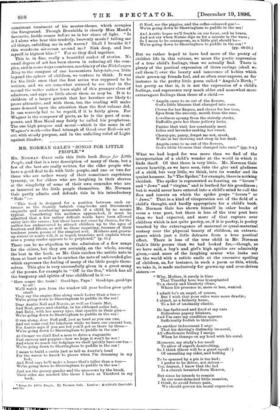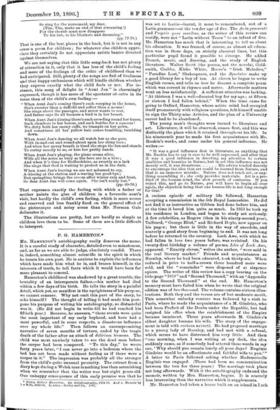MR. NORMAN GALE'S "SONGS FOR LITTLE PEOPLE."*
MR. NORMAN GALE calls this little book Songs for Little People, and that is a true description of many of them, but a few of the beet are really written for the elder people who have a good deal to do with little people, and one or two for those who are rather weary of their sometimes capricious tyranny, or for elders who are laughing in their sleeves at the simplicity of some of their own comrades who are as innocent as the little people themselves. Mr. Norman Gale partly admits and defends this in his introductory
"Note " "This book is designed for a position between such ex- tremes as the frankly babyish song-books and Stevenson's exquisite and everlasting memorials of a child by no means typical. Considering the audience approached, it must be admitted that a few rather difficult words have been allowed entry into the verses ; but these have not come by chance, for the author has endeavoured to attract children up to the ages of fourteen and fifteen, as well as those requiring, because of their tenderer years, poems of the simplest sort. Mothers and grown- up sisters or aunts will, it is hoped, translate and explain when- ever a young reader appears to be perplexed." (p.
There can be no objection to the admission of a few songs for the elders, bat they are certainly, on the whole, among the best in the book, as Mr. Gale catches the satiric note in them at least as well as he catches the note of unbounded glee which expresses the feeling of many of the little people them- selves. This glee is very successfully given in a great many of the poems, for example in "Off to the Sea," which has all the buoyancy and spirits of true childhood in it :—
" Here comes the train ! Good-bye, Papa ! Good-bye, good-bye to all !
We'll watch you from the window till your bodies grow quite small.
They say the engine flies along much faster than a bee— We're going down to Sherringham to paddle in the sea!
Dear Auntie Nell and Nursie, as well as Cousin Mat, And Noel, grave and chubby, in his ribboned sailor hat, And Baby, with her merry eyes, that sparkle in their glee— We're going down to Sherriugham to paddle in the sea !
0 run along, dear Puff-puff, just as hard as you can run. And eat some coal for luncheon while we have our currant bun, For Auntie says if you are fed you'll get us there by three— We're going down to Sherringham to paddle in the sea!
At Cromer we shall find a man to drive a wagonette Past succory and poppies—how we hope it won't be wet ! And when we reach our lodgings we shall quickly have our tea— We're going down to Sherringham to paddle in the sea !
I mean to build a castle just as tall as Auntie's head For the waves to knock to pieces when I'm dreaming in ray bed; And Noel says he'll make a house that's taller than a tree— We're going down to Sherringham to paddle in the sea !
Just see the goosey-gander and the moo-cows by the brook, Their sides are marked like those I have at Thetford in my book,
• Songs for Little Pooplo. By Norman Gale. Londin : Archibald Constable and Co. 0 Noel, see the piggies, and the coffee-coloured gee !— We're going down to Sherringham to paddle in the sea!
And Auntie hopes we'll freckle on our faces, and be brave, And not cry when Nursie dips us for a minute in the wave ; So I mean to be courageous, as a little girl should be— We're going down to Sherringham to paddle in the sea!"
(pp. 48-50.)
But we rather hoped to have had more of the poetry of childish life in this volume, we mean the poetic expression of a true child's feelings, than we actually find. There is plenty of the poetical expression of those ravings (shall we call them ?) over the beauty and innocence of babies which their grown-up friends feel, and so often over-express, as for instance in the pretty little poem called "Angela's Birth;" but pretty as that is, it is not the expression of a child's feelings, and represents very much older and somewhat more extravagant feelings than those of a child :—
" Angela came to us out of the flowers,
God's little blossom that changed into ours.
Cloves for her fingers, and cloves for her toes, Eyes from the succory, mouth from the rose.
Loveliness sprang from the sisterly stocks, Daffodils gave her those yellowy locks.
Fairies that visit her constantly meet Lilies and lavender making her sweet.
Cherry-pie, pansy, forget me-not, musk, Wake in her dawning and sleep in her dusk.
Angela came to us out of the flowers, God's little blossom that changed into ours." (pp. 3-4.)
What we had hoped for was more than we find of the interpretation of a child's wonder at the world in which it
finds itself. Of that there is very little. Mr. Norman Gale enters heartily, as we have seen, into the glee and gladness of a child, but very little, we think, into its wonder and its quaint humour. In" The Spider," for example, there is nothing childish. The spider is represented as feasting on "lovers" and " Jews " and "virgins," and is loathed for his greediness ; but it would never have entered into a child's mind to call the flies and insects on which the spider preys " lovers " or '• Jews.' That is a kind of vituperation oat of the field of a child's thought, and hardly appropriate for a child's book. Mr. Norman Gale has shown himself in other books of verse a true poet, but there is less of the true poet here than we had expected, and more of that rapture over children which is not quite poetry, or, if it is poetry, is poetry touched by the extravagance of maternal or quasi-maternal ecstasy over the physical beauty of children, an extrava- gance which just a little detracts from a true poetical effect. There is less of the true child in Mr. Norman Gale's little poems than we had looked for,—though, as we have said, a boy's and girl's high spirits are admirably given,—and more of the laughing senior who looks out on the world with a satiric smile at the excessive spoiling of children, as, for instance, in such a poem as this, which, we take it, is made exclusively for grown-up and over-driven sisters :—
" Why, Mother, it surely is time
That Timothy here was transplanted To a sheety and blankety clime, Where his presence is, more or less, wanted.
I admit he's an angel, of course, But I wish that your rules were more drastic; I object, as a fatherly horse, To a bit of uncleanly elastic.
He has fashioned and fixed at my ears Ridiculous papery blinkers, And I'm sure my condition appears Sufficiently foolish to thinkers.
As another inducement I urge
That his driving's distinctly immoral, All affectionate feeling I merge When he thumps on my head with his coral.
Moreover, my study's too small To allow of superb demivolting, So I think (there will be a great squall !) Of unseating my rider, and bolting To be sparred by a pin is too bad; I prefer to be driver, not driven— Yes, dearest, I know that the lad Is a cherub levanted from Heaven, But since he intends to remain In our semi-detached little mansion, I think, to avoid future pain, We should govern his moral expansion. So ring for the nursemaid, my dear, (Tim, Tim, make an end of that screaming !) For the cherub must now disappear To his tub, to his blankets and dreaming." (pp. 77-78.)
That is one of the best pieces in the book, but it is not in any sense a poem for children ; for whatever else children appre- ciate they certainly do not appreciate satiric banter directed against themselves.
We are not saying that this little song-book has not plenty of attraction in it, only that it has less of the child's feeling and more of the feelings of the critic of childhood than we had anticipated. Still, plenty of the songs are full of liveliness and that happy enthusiasm which will kindle children whether they express exactly what the child feels or not. For in- stance, this song of delight in "Aunt Jan" is charmingly expressed, though it has more of the spectator ab extra in its verse than of the child's own feeling :—
" When Aunt Jan's coming there's such romping in the house, She's sweeter than a daffodil and softer than a mouse! She sings about the passages, and never wants to rest, And father says its all because a bird is in her breast.
When Aunt Jan's kissing there's such crowding round her knees, Such clambers to her bosom, and such battles for a squeeze ! We dirty both her snowy cuffs, we trample on her gown, And sometimes all her yellow hair comes tumbling, tumbling down.
When Aunt Jan's dancing we all watch her as she goes, With in-and-out and round-about upon her shiny toes ; And when her merry breath is tired she stops the fun and stands To curtsy saucily to us, or kiss her pretty hands.
When Aunt Jan's playing, the piano seems alive, With all the notes as busy as the bees are in a hive ; And when it's time for Bedfordshire, as sweetly as a lark She sings that God is waiting to protect us in the dark.
When Aunt Jan's leaving we are not ashamed to cry, A-kissing at the station and a-waving her good-bye ; But springtime brings the crocus after winter rain and frost, So dear Aunt Jan will come again. She isn't really lost."
(pp. 69-70.) That expresses exactly the feeling with which a father or mother paints the glee of children in a favourite aunt's visit, but hardly the child's own feeling, which is more secret and reserved and less frankly fixed on the general effect of the picturesque and noisy scene than Mr. Norman Gale
delineates it.
The illustrations are pretty, but are hardly so simple as children love them to be. Some of them are a little difficult to interpret.











































 Previous page
Previous page